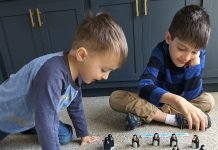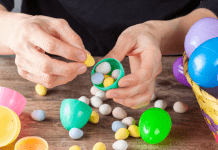Good thing I didn’t get into the business of occasional-freelance-voluntary blog writing to make friends, because what I’m about to say will not win over many hearts.
Y’all, the Elf on the Shelf is not doing us any favors. And I’m not just saying that because I’m Grinch-ish. I’m saying that because it’s potentially pretty harmful. I’m not the first to write about this, in fact this professional, this child psychologist, this person, this writer, this mom of five, and this mom with a doctorate in human development, have covered it all before.

I’m not going to try to add original commentary to what’s already been written about – by people more qualified than me – but I am going to say this: for more than six years I worked as a teacher coach helping over 300 teachers establish and develop classroom management strategies based on relationship building. So, I know some things about behavior management best practices – and a spying little elf that tattles to Santa is not on the list.
You know what is though? Trust.
I’m not trying to make false equivocations between teaching and parenting, but at the core of all we do as parents and teachers, our ultimate responsibility to ensure our children can navigate the world independent of our direct guidance. And to do that requires trust.
Trust is the primary currency in a relationship. Especially when half of the people in that relationship still go to elementary school. Children have few choices but to trust that the adults in their lives – especially their parents – can be depended upon to keep them safe. Trust is the heart of vulnerability. It’s the fuel of courage.
And as shame, resilience, and vulnerability expert Brene Brown says,
“Trust is built in very small moments.”
Very small moments like when we use an inanimate object that “reports” every indiscretion as a tool for changing behavior. Those moments erode trust, not build it. Behavior management practices that rely on the threat of withholding something of value to a person is actually called coercion. And I could be wrong here, the world is a very big place, but it’s hard for me to imagine a relationship in which coercion builds trust.
And let’s just be honest here, we all know that “Santa” is going to bring whatever was already on your list whether or not your child gets their act together and follows directions the first time. I’ve made empty threats before too, I’m certainly not innocent of that, but I struggle to accept that using an doll for 25 days once a year is the healthiest long term solution to the challenge of teaching our children right from wrong.

This is certainly not an indictment of parents who enjoy the annual visit of Kringle (feel free to yell at me in the comments), it’s bigger than that.
Elf on the Shelf, and its sister-products, take advantage of parents’ need for some calm in the midst of the most chaotic season of the year – sometimes making it more chaotic in the process! And in doing so, the product chips away at those very small opportunities to build trust, which I’m sure is the exact opposite of most parents’ intentions.
I’m also not attempting to imply using Elf on the Shelf is going to result in major psychological damage to our children, but given how important trust is and how hard it is to repair when it’s broken, there are likely better – less surveillance-based – ways to encourage healthy behaviors while still enjoying the festivities of the season.

















I agree I don’t use it I don’t need something to make my kids listen to me they just need listen to me not because of something that you use for a couple of weeks
I agree with this and I also think it is 100% added stress in an already busy and stressful season. I don’t want to think of 25 creative ways to display an elf and I don’t want to think about it all month.
The issue I personally have with Elf on the Shelf and Santa (and the Easter Bunny and the Tooth Fairy, etc.) are people passing off imagination as truth and reality and essentially lying to kids. To me, that’s what gets our culture in a whole lot of trouble since even grown up people still can’t seem to separate imagination from reality.